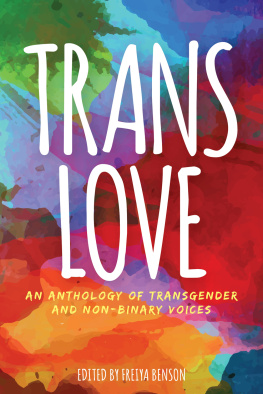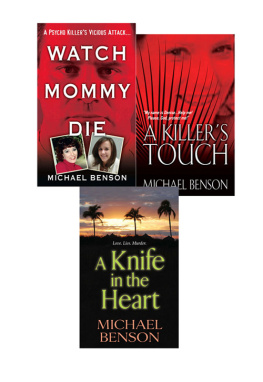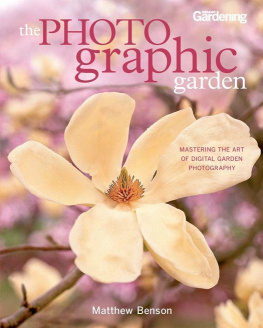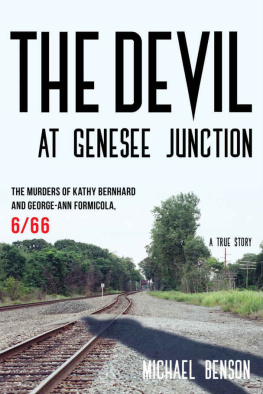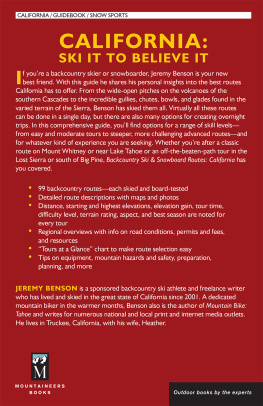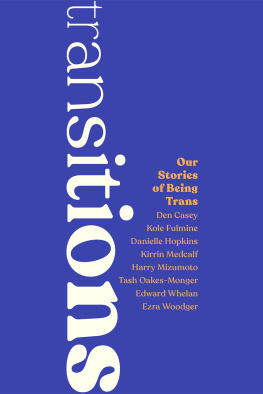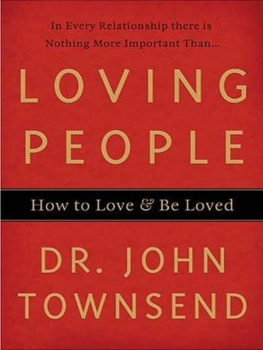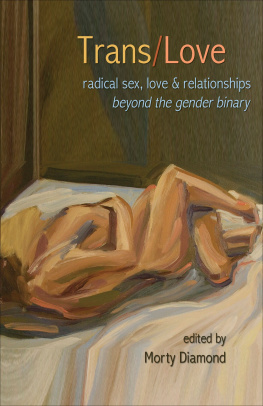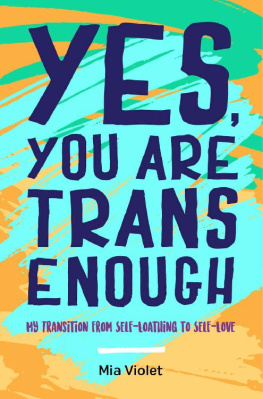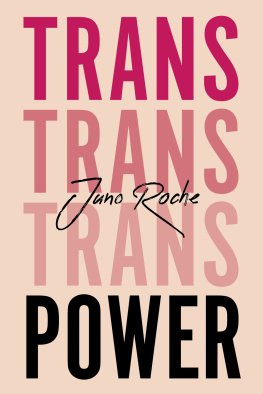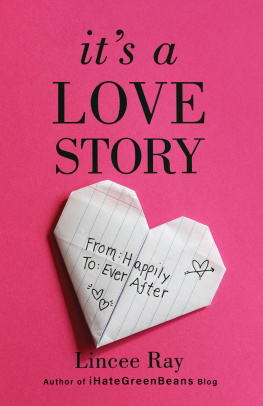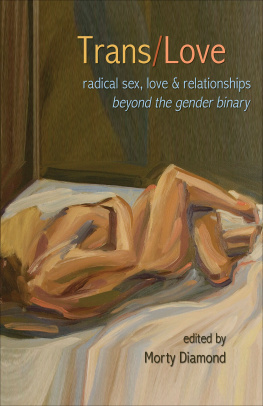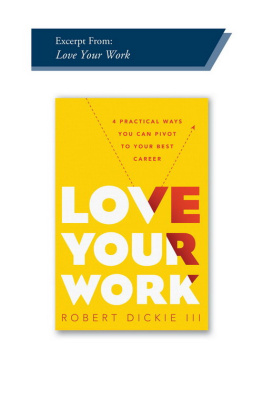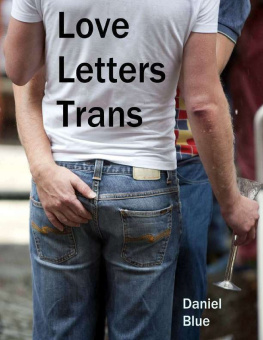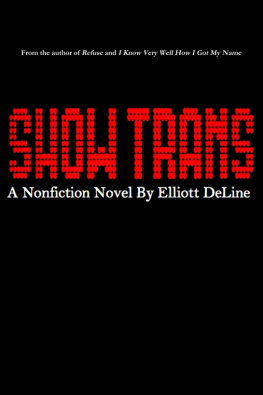
TRANS LOVE
AN ANTHOLOGY OF TRANSGENDER
AND NON-BINARY VOICES
Edited by Freiya Benson

Jessica Kingsley Publishers
London and Philadelphia
CONTENTS
Disclaimer
Self-identity is a hugely personal thing. We all have a lot of words to describe how we identify, and we also all attach various meanings to those words. This book features the work of many different people, and what their identity means to them. The language used in each piece of writing is personal to the individual writing it, and is specific to their experiences and how they see themselves.
INTRODUCTION

This is a book about love.
Its about the highs and the lows, the dizzy feeling of euphoria, the dark crashing waves of disappointment, the pain and the joy.
Its also a book about how that works out for trans and non-binary people.
Im hoping that some of you know what that all means, but equally, maybe youve just picked this up, enticed by the cover, and now youve read that first sentence youre feeling a little confused.
Well first, dont worry! Im going to run through some definitions, go over the basics and do the groundwork, so that were all on the same page.
And where better to do that than the first page?
Lets start with the word trans. A trans person is someone who doesnt feel that they are the gender they were given when they were born. For example, when I was born, the doctor looked at my bits and, based on what they saw, decided I was male. This is fair enough I was after all a tiny baby, and at the time couldnt say, Woah there, doc, lets take things a little steadier and see what happens.
As time went on though, and I started to develop language to describe how I felt, I was able to say, Actually, you know what? This doesnt feel right, but I do know how to fix it.
Obviously, the bit where I fixed it was more than just me going Im a woman, but you get the idea.
The word trans is also a shortened form of the word transgender, which was first (as far as we are aware) used in the 1960s, as an alternative to the word transsexual. It gained more popularity in the 1990s as an umbrella term to describe different gender variant identities, as well as being an identity in its own right.
Today, people largely use trans or transgender depending on personal preference. Both are equally valid and both are words used within and outside the trans community to describe who we are. The word transsexual is also still used by some trans people to describe themselves, but on a less frequent basis. Broadly speaking, it can sometimes be seen as an outdated term to use to describe trans people nowadays, especially in a collective sense, and when used by people from outside the trans community. In relation to this, it is worth mentioning that its important to respect how trans people describe themselves and to be led by the words they use, be they trans, transgender or transsexual.
For trans people, being who we are is often an easy thing to understand because we all feel this. For people who dont identify as trans though (also known as cis or cisgendered people) its something that can be a little more challenging to understand.
Ive had people ask, How do you know youre trans? And honestly, I just do, in the same way that you may know youre not. Its not the clearest answer, because I dont think there is a clear answer, but like many other things to do with how we feel, like love for instance (see what I did there, eh?), sometimes we just know.
I know that despite being born with a penis, one of the traditional markers of maleness, I am not a man. I know this because I feel it inside, like a wrongness within my core sense of self. I know that Im not imagining this, because Ive spent years exploring this feeling, working out what it means, and along the way I have found lots of other people who feel the same. I also know because, honestly, being trans is pretty hard, and if I didnt feel so strongly about it, like I do, then Id probably just not do it.
The other word thats going to come up a lot is non-binary. Sometimes its hyphenated and sometimes its not. Sometimes its one word, nonbinary and again, sometimes its not. For the purposes of this book though, its all the same thing, and the hyphens, gaps or non-gaps are just a reflection of that particular writer.
Binary, roughly defined, is stuff consisting of, or related to, two things. Examples could include combinations like black and white, one and zero, asleep and awake or, if were talking gender, male and female.
Non-binary, again roughly defined, is something not related to or consisting of just two things. To put it in another way thats more connected to identity, non-binary is often used in reference to any identity thats not exclusively male or female. This can also include feeling as if you dont fit in at all with either of these binary genders, or if you fluctuate between them, or are outside the gender spectrum, without gender entirely (also known as being agender). Like the word trans, some people view it as an umbrella term, and some people see non-binary as falling under the umbrella of being trans, while others see it as something separate.
(If you want to know more then skip ahead to Meg-John Barkers chapter in this very book!)
As before, when we spoke about the words trans people can use to describe themselves, its good not to assume, as identity is personal and self-defined, and its not our place to tell someone how they should be or what words they should use.
Basically, be respectful and be nice.
In this anthology, there is writing by trans people and writing by non-binary people, and hopefully that will also help give you a broader understanding of what these identities mean.
Of course, if you already know all this youre probably good to go, so thank you for waiting while we all catch up a bit.
Youre great. (Yes, you!)
What about love?
Ah love. Its a big word to try and define, as its so widely used in so many different contexts. However, I asked around, and these are some of the many words people used to describe love:
Intense
Home
Everything
Meaning
Opening
Comfort
Encompassing
Roots
Vulnerability
Connection
Safety
Empathy
Oxytocin
Seeing
Scary
Strong
Full-on
Amazing
Paradox
Tricky
Beautiful
Elusive
Fleeting
Missing
Patient
Everywhere.
Love is such a big word that the ways to describe it are almost endless. The words we use are powerful and often contradictory because there are so many ways to love, and theyre all unique to the individual experiencing it.
People also use the word love when theyre really into something, at the end of letters and texts, and as a term of affection when speaking to others (but only in Britain, and possibly only used by British characters in American sitcoms). Amusingly, its also a score of zero in tennis, which, depending on your experiences of love, could be strangely poignant.
You can use the word love in phrases (things just didnt work out, I suppose we fell out of love) and as an expression of frustration (for the love of God, or strangely, for the love of Mike, which is a British phrase that hardly anyone uses).
Love is everywhere when it comes to proverbs, and is used worldwide. Love is blind is an obvious one, but others include Love itself is calm: turbulence arrives from individuals (China), Love sickness hurts but does not kill (Mexico), In love, beggar and king are equal (India), The heart that loves is always young (Greece).
Next page
